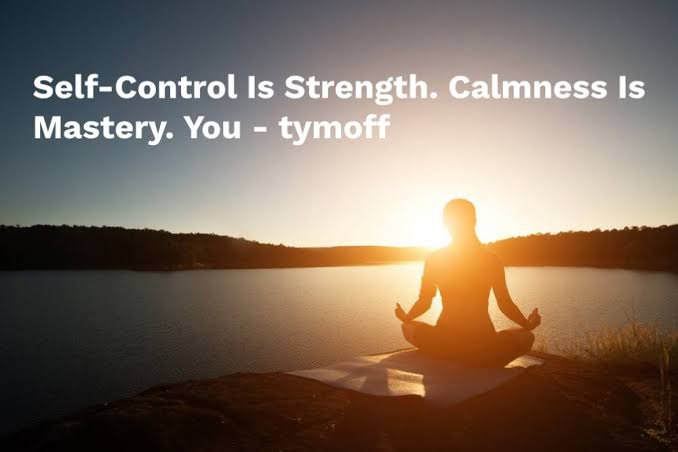In today’s fast-paced, often chaotic world, self-control and calmness are rare yet invaluable qualities. These traits are not only admired but are essential for navigating life’s many challenges. The phrase “Self-control is strength. Calmness is mastery. You – Tymoff” captures the essence of personal empowerment, urging individuals to harness their inner discipline and remain composed in the face of adversity.
Self-Control is Strength
Self-control is the ability to regulate one’s emotions, thoughts, and behaviors in different situations. It is often viewed as a key ingredient for success, as it helps individuals stay focused on their goals, resist temptations, and manage impulsive reactions. This quality is a form of strength because it enables one to maintain control over their own lives, despite external pressures.
Consider the distractions and temptations that bombard us daily. From social media to unhealthy habits, it’s easy to lose focus and get off track. However, those who have mastered self-control can stay disciplined, avoiding the pitfalls that others may succumb to. This inner strength builds resilience, allowing individuals to stay committed to long-term goals, even when faced with short-term obstacles.
Calmness is Mastery
While self-control represents strength, calmness is the hallmark of true mastery. Staying calm under pressure is a sign of emotional intelligence and maturity. It’s easy to lose your cool when things don’t go as planned, but maintaining composure allows you to think clearly and make better decisions.
Calmness also diffuses tension in stressful situations. It provides the space to respond rather than react, leading to more effective problem-solving. In mastering calmness, you gain control not only over your actions but over the environment and people around you. A calm demeanor inspires trust and respect, qualities that are essential in leadership and personal relationships.
You – The Key Element
The inclusion of “You” in the phrase reminds us that self-control and calmness are personal choices. It is up to each individual to cultivate these qualities. Tymoff, in this context, seems to emphasize personal responsibility. The journey towards self-mastery begins with a decision to take charge of your emotions and actions.
No one can give you self-control or calmness; these traits must be nurtured from within. It requires introspection, practice, and often, failure. But with time, these qualities can become second nature, empowering you to lead a more balanced and fulfilling life.
The Impact of Self-Control and Calmness on Success
Those who embody self-control and calmness are often seen as reliable, steady, and grounded. These traits contribute to success in both personal and professional realms. In work environments, individuals who remain calm and exercise self-control are more productive and effective at resolving conflicts. They are the ones who can step back, analyze a problem, and find solutions without being overwhelmed by stress.
In personal relationships, these qualities foster deeper connections. People gravitate toward those who are calm and composed, feeling safe and supported in their presence. Self-control ensures that emotions are communicated effectively and respectfully, reducing unnecessary conflict and fostering mutual understanding.
Developing Self-Control and Calmness
Building self-control and calmness takes time and effort. Here are some steps to get started:
- Mindfulness Practices: Meditation, deep breathing, and yoga can help you become more aware of your thoughts and feelings, which is the first step to gaining control over them.
- Set Clear Goals: Having clear goals gives you a reason to practice self-discipline. Knowing what you’re working toward makes it easier to resist distractions.
- Pause Before Reacting: When faced with a stressful situation, take a moment to pause. This small gap allows you to process your emotions and respond calmly rather than react impulsively.
- Self-Reflection: Regularly reflect on your actions and reactions. Ask yourself where you lost control or stayed calm, and use these insights to improve.
- Practice Patience: Patience is closely linked to self-control. Learning to wait and letting things unfold without rushing builds both self-discipline and calmness.
Read also: Halo (2003) Game Icons and Banners: A Retrospective Look
Conclusion
“Self-control is strength. Calmness is mastery. You – Tymoff” serves as a powerful reminder of the importance of inner strength and composure. In a world that constantly challenges our patience and emotional balance, these qualities stand out as beacons of personal mastery. By cultivating self-control and calmness, you equip yourself with the tools necessary to thrive in all aspects of life, ensuring a path to lasting success and fulfillment
